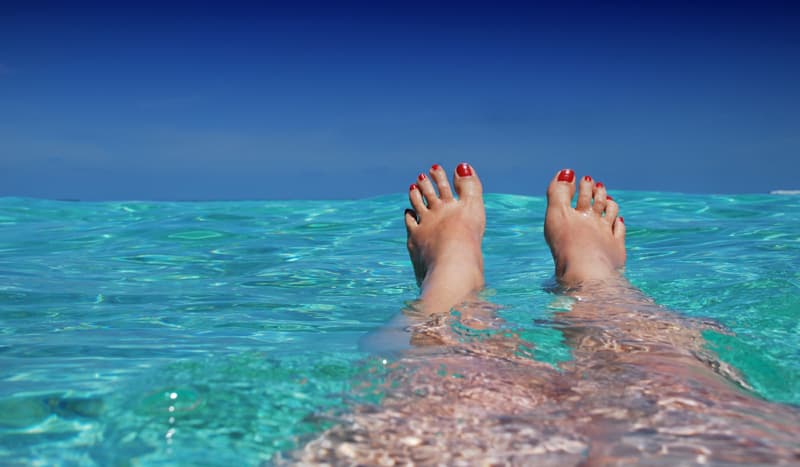How To Cope With A Heatwave

We don't all have access to a swimming pool, so what can we do to cope with the higher temperatures? Experts suggest that hotter summers could be here to stay.
The Signs Of Heat Exhaustion
If you are experiencing headaches, dizziness, loss of appetite, nausea, fast breathing and intense thirst do cool off immediately and seek medical attention. The severity of heat exhaustion is that if your body temperature rises over 40 degrees centigrade then you can suffer a stroke. In extreme circumstances you can die of the heat. This can affect the elderly more than other age groups. But what can we do to ensure that we stay safe in the heat?
Wear Cool Clothing
Many people make the mistake of wearing too little in hot weather which can cause sunburn. The key is to wear light colours which don't absorb heat and to wear loose clothing which lets air circulate around your body.Also wear materials that breathe like cotton and linen. Hats are also essential, but use hats that offer ventilation.
To help you sleep keep your bedroom cool during the day by keeping curtains closed. get rid of the duvet and sleep under a sheet. Also, investing in an electric fan can be a good idea as this helps move air around your body and helps sweat to evaporate.
Keep Hydrated
When we sweat we lose water, it is essential that that water is replenished. Don't forget that many foods contain water including strawberries, cucumber, lettuce and melon.Try not to drink too many fluids that can actually cause dehydration like coffee and of course alcohol. Also try to avoid drinks high in sugar. There is also evidence that eating spicy food does actually cool you down. The science behind this is that the act of sweating when we eat spicy food is an effective way of releasing excess heat from our bodies.
Stay Indoors
Where possible try to stay indoors. if you do need to go out try to avoid the hottest times of the day. This is between 11 am and 3 pm.Take cold showers or have damp cold towels on hand. Watch the amount of exercise you do. This may be the time to use isotonic drinks as they will help you rehydrate.
Keeping Babies Cool
Babies should really be kept out of the sun where possible, given plenty of fluids and also have high protection sunscreen applied. If you are breastfeeding your baby they will not require additional water but if you are bottle feeding you can give cooled boiled water in addition to milk feeds.
Looking After Your Dogs
the key message is to never leave your dog in a car, conservatory, outbuilding or caravan in this heat. Temperatures can rise to 47 degrees centigrade and your dog could die.You can buy pet suncream to apply to your dogs ears and nose. Make sure your dog is kept in shady, cool conditions and has plenty of cold drinking water on hand. You may also want to buy a paddling pool for your dog to cool down in. Walk your dog in the coolest times of the day i.e early morning and late in the evening and watch out for very hot pavements which can hurt dogs paws. If you place your hand on the pavement, if it feels hot then don't walk your dog on it.
Working In The Heat
To date there is no law in the UK that stipulates how hot it has to be to allow you not to work. Employers however have a duty to make work temperatures reasonable.Employers are asked to ensure that employees have access to water and that strict codes of dress are relaxed.The argument against changes in the law are that some industries have to operate in high temperatures so a change in the law could be unworkable.
You Might Like
How Lemons Can Help You Revise
Its that time of year again when revision fever hits. New research suggests that there are ways you can maximise your revision time and they include smelling lemons!Cloud Computing and How Businesses Can Benefit
Look to see how cloud computing can benefit your business with this quick article and guide.How Skiing Can Improve Your Health & Lifestyle
When you head off for your winter holiday, do you know how skiing and boarding can help to improve your health and even your lifestyle? Find out more.How Exercise In Old Age Can Protect Our Immune System
Keeping fit in old age can be just as important to our immune system as for our weight and mental health. Read our guide to see how you can make some simple changes.How To Deal With A Stressed Kitty
Check out our guide on how to deal with a stressed cat and ensure you help them chill out. Simple things you can do for a pet happy household.
Useful Websites
- Hearst Magazines & Digital Mags
Get a great deal on your favourite magazines. Covering fitness, style, home, living and more. Subscriptions start from £1 and you also get free UK delivery. - Boots.com Health & Beauty
Buy health and beauty products online from the UK's most popular chemist. Find pharmacy services,prescriptions,baby,diet and fitness products. - Health And Beauty Products.
Offering a range of health and beauty products including make up, skincare and perfume. - Maximuscle Sports Nutrition
Maximuscle offer sports nutrition products that aim to help you build muscle. So check these products out for bigger arms, broader shoulders and a bigger chest. - Superdrug
Great range of beauty products including make up, skin care and fragrances. - Magazines Direct
Providing a whole host of magazine titles covering wellbeing, living, health, fashion, homes, wine and golf. Over 40 iconic brands catered for. - Add Your Website Here